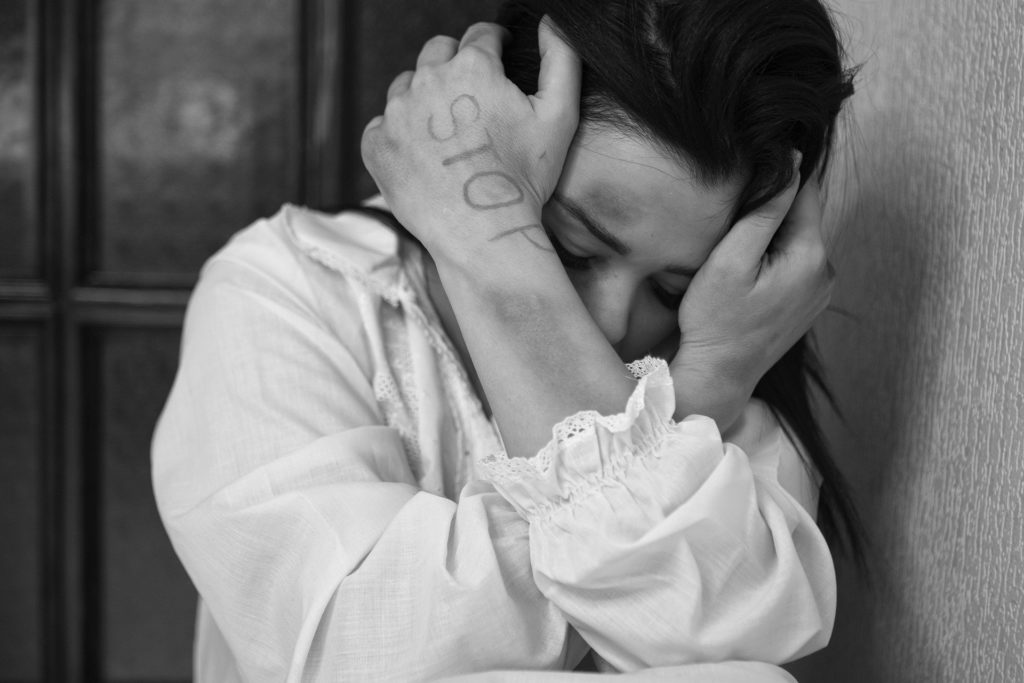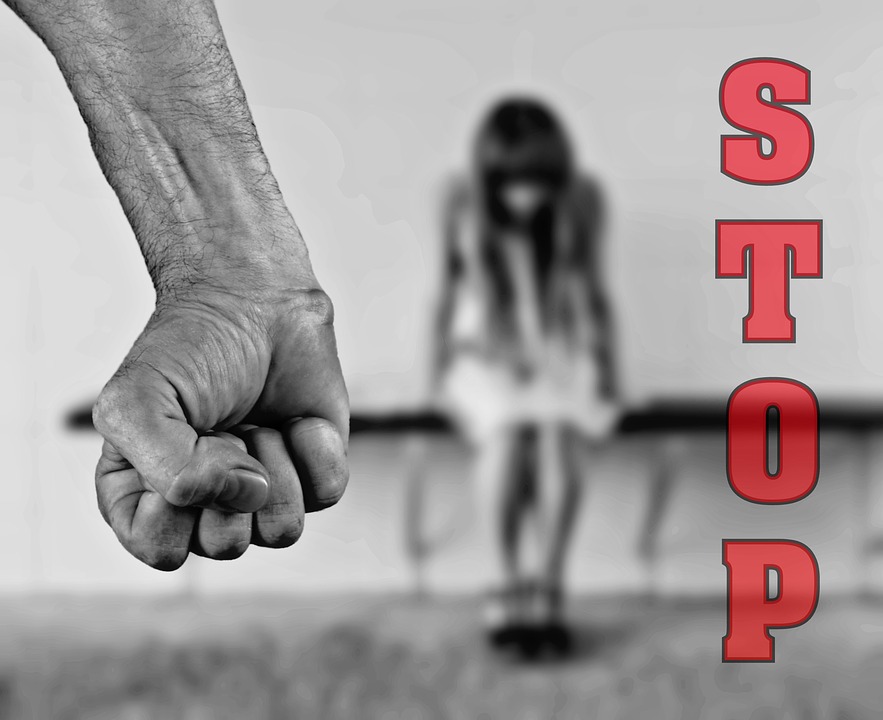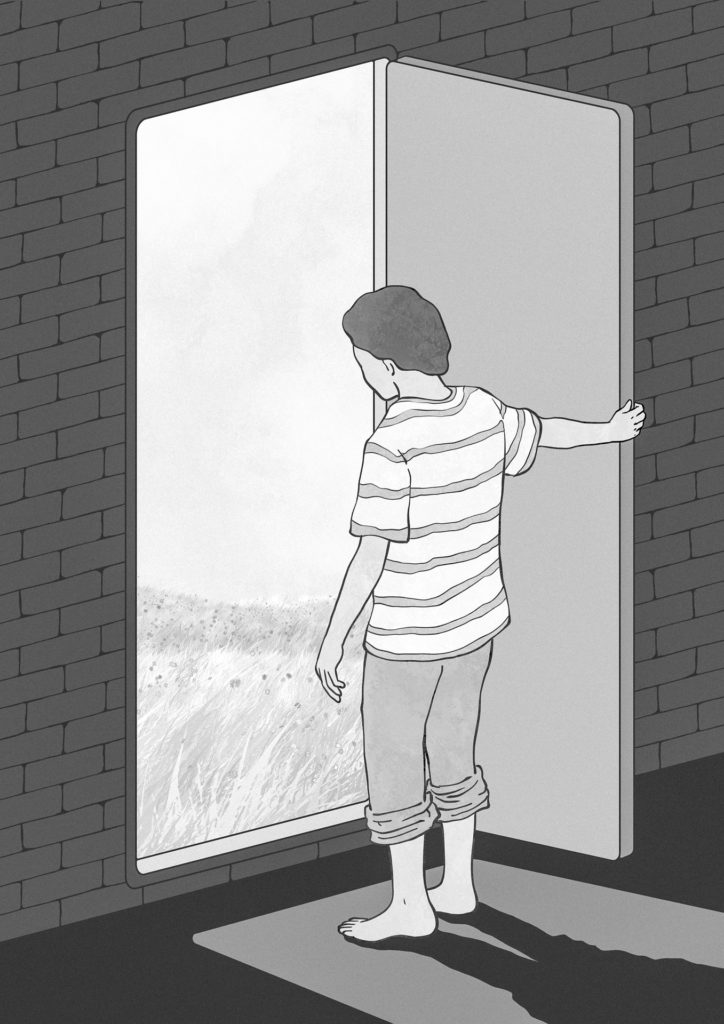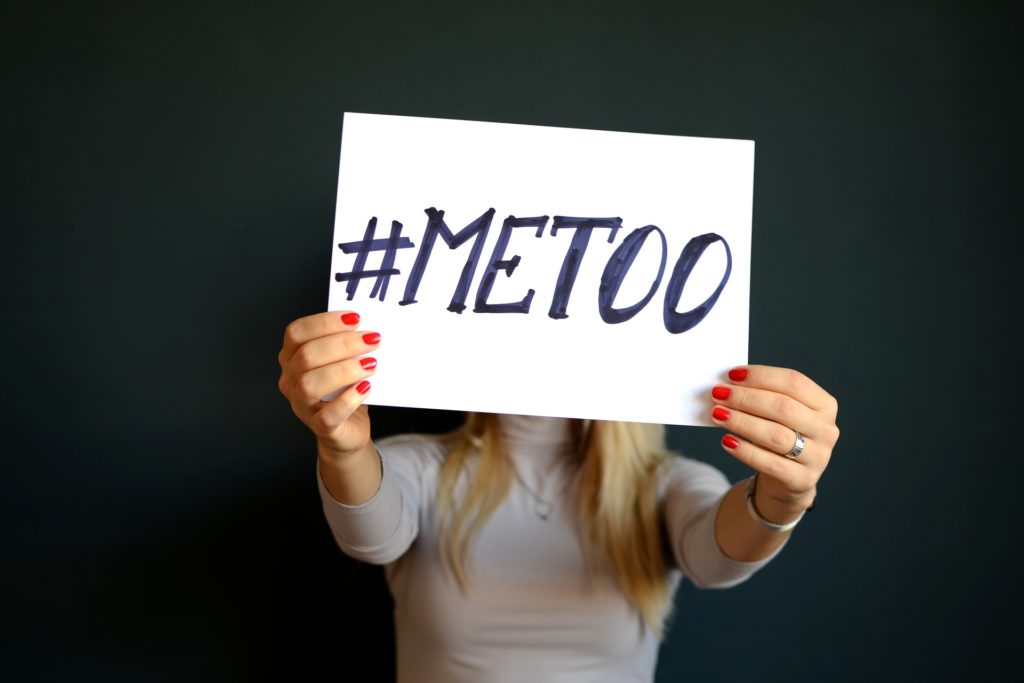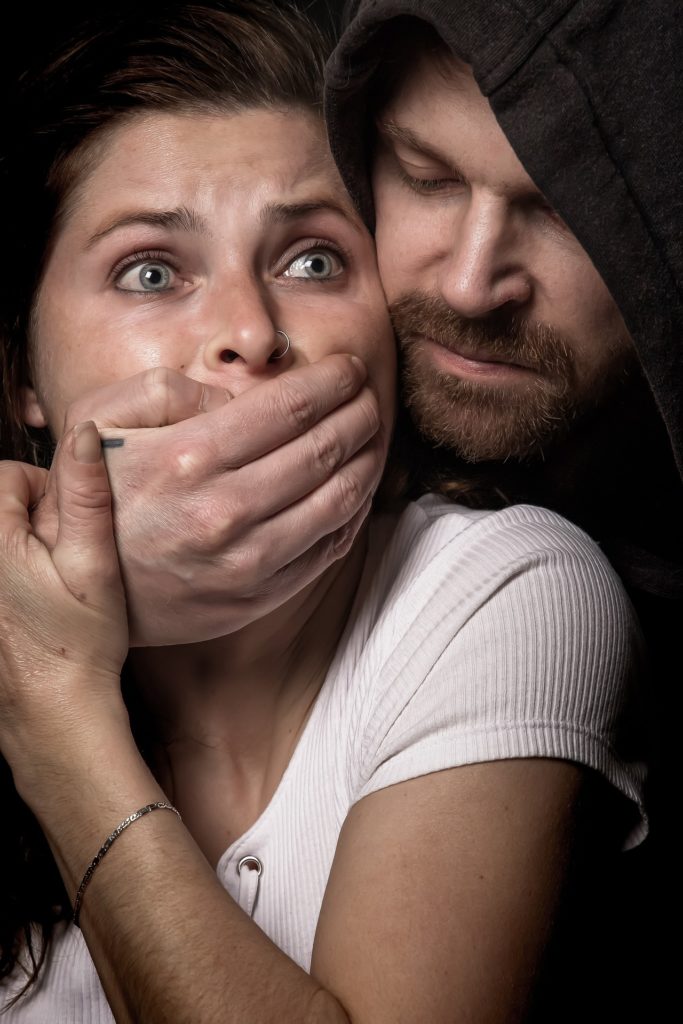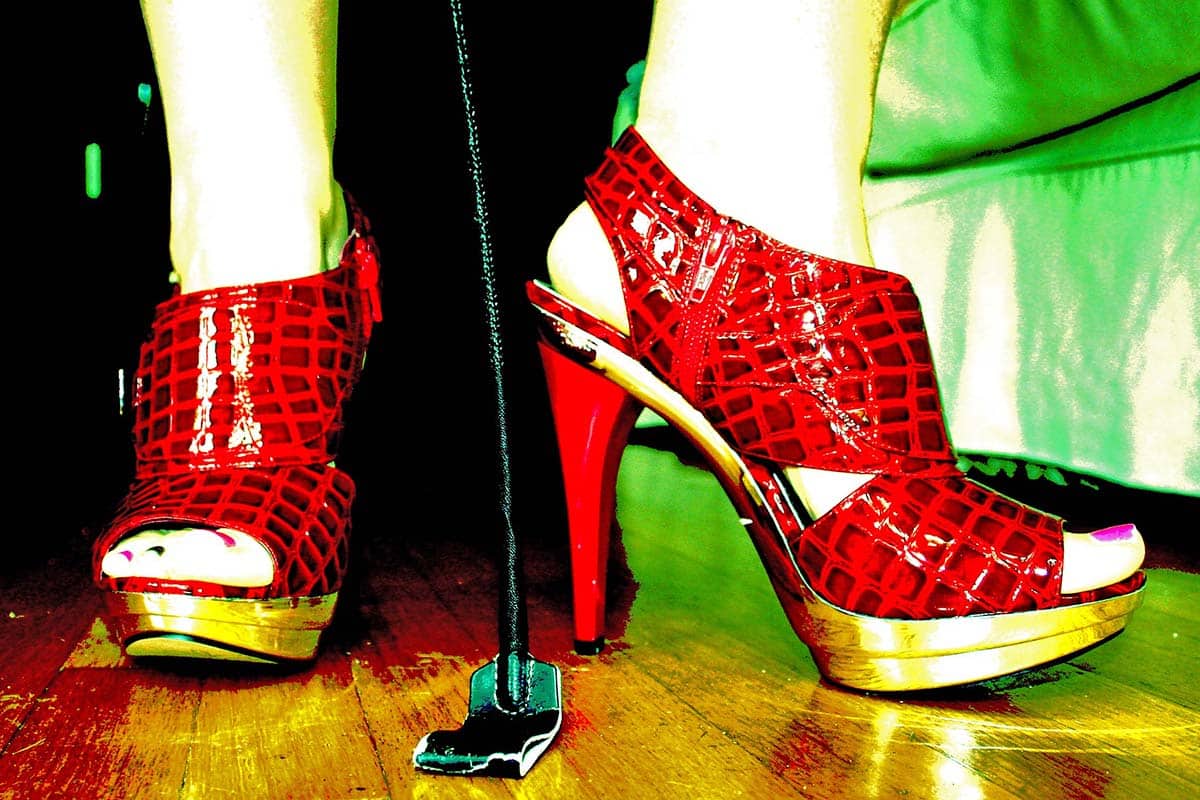By Taylor Van Arsdale
DISCLAIMER: This article discusses violence against women. Not everyone will resonate with the opinion expressed here, nor should they. It is not a catch-all. There are women who have had no prior indication they would be raped. This article is NOT about those women.
I was 14 years old and welcoming a new family into our neighborhood. They had moved into what our block had come to refer to as the “haunted house,” a dilapidated Victorian surrounded by a rusted, hoop and spear, iron fence forged sometime the 1920’s. The former owner was a reclusive, elderly man with an equally old pug. Since we only saw him when he walked his dog—and he rarely spoke to us—we grew up believing his house was “haunted.” Soon after he died, a new family moved in, tore down the iron fence and began repairing, repainting and living in the house. Most of the family’s children were younger than me, aged between seven and nine, but one child, their eldest, Rob, was 15 going on 16. I said, “hello” as I passed by his yard. We chatted and in the spirit of being neighborly, I suggested we hang out. He invited me over to his place one afternoon, after school, and as was customary, I told my mother where I was going. It was an ordinary day, unlike any other.

When I arrived, I saw his brothers and sisters playing in the yard, but I didn’t see his parents. I inquired as to where they were and he said they were out but would be back soon. I had a split second hesitation about not going inside but ignored that gut feeling. Honestly, I was curious about the inside of the house. All those years, finally being able to look inside. I was curious. So we went upstairs to his bedroom to listen to records and before I knew what was happening he had aggressively pushed me down on his bed, and was holding me there. I was on my stomach, and his bed, which was level with the window, allowed me to see outside. When I naively asked what he was doing he said, “Don’t pretend like you don’t know what you came here for.” He wouldn’t let me up. When I resisted, he clamped down even harder. He was immensely stronger than me and I innately understood that even if I fought back, which I distinctly gathered he wanted me to do, I wouldn’t have had a chance of getting out of there.
So there I was, pressed down on a bed, looking out a second story window, down at the street where I’d stood so many times as a child, looking up at a house we used to mockingly call “haunted” realizing that I was about to be raped inside that very home.
And then, in an instant of good fortune or divine intervention or whatever you want to call it his nine year-old brother burst into the room. When Rob turned to berate his younger sibling he momentarily released his grip and I bolted. I ran down the steps, out the front door past the new gate and around the corner back to my home. I told my mother what had happened and we returned later that day to confront Rob’s parents. Rob’s mother and father refused to believe that their son could be capable of such heinous behavior. Then, in a similar act of unexpected aggressiveness, the father demanded that my mother and I get off their property and threatened us both with bodily harm. Nice family. Like father, like son, apparently. I saw something in that young man’s eyes that day in his bedroom that no one should ever see or experience—a vile rage and hatred of women, a lack of respect and empathy for human beings in general, and yes, I’ll say it, an inherent evil.
I stayed away from that house for a long time.

The second instance was almost six years later. I was at college at ASU and if you’ve read my book, Cocaine To Bain: Sex, Drugs, Rock ‘n’ Roll and the Inside Story of the Hollywood Guitar Center you know that during those tumultuous years I spent many a night snorting cocaine and thus, made a series of misdirected choices. Dating this particular man, let’s call him “Joe” was one of them. I honestly cannot recall how I met Joe, but I do remember that he was handsome in the traditional sense and unlike most guys I’d been dating was a rather muscular guy.
Joe invited me to dinner and I picked him up at his house. It was always my practice to drive my own car on first dates, just in case things got weird, and I needed to getaway (remember: I’m from NY and New Yorkers have a low trust threshold). Joe lived at the end of deserted cul-de-sac and I remember having the slightest twinge of animosity but once again, I brushed it off as a ridiculous feeling. Joe came outside, got in my car and then said something like, “Oh. I forgot my wallet; I’ll be right back.” When he exited my car he turned back around and invited me to come in for a minute and “see the place.”
This was well-appointed two-story home in north Scottsdale. Another guy our age was leaving as I was walking up to the house. This was Joe’s roommate. Joe briefly introduced us, we exchanged pleasantries, I wished his roommate a good evening and Joe and I went inside.
It was hard to believe two college guys inhabited this immaculate house. Joe was well off, and I freely admit, it was a slight turn on. Almost all the guys I’d been with were either deadbeat musicians or working their way through school. I was impressed.
Joe asked me if I wanted a tour and I agreed. We walked through the kitchen, the living room, and then we went upstairs. He took the master bedroom, a double-door suite, because he said he “paid more of the rent,” and therefore he felt he should have the better room. I asked him if he’d found his wallet because I didn’t want to be late for our reservation and without warning, he pushed me down on the bed and foisted himself on top of me.
I had felt this before. When I was 14. It was the same experience but with a different person. Again, I asked him, what he thought he was doing and again, came the same answers—“You know you want this,” and “You wouldn’t have come in if you didn’t want to get fucked,” etc. And once again, the guy was physically stronger than me. I couldn’t do anything; I couldn’t move. I was about to get raped.
And then, in a very odd moment of déjá vu, his roommate returned and opened the double doors to the bedroom, just like Rob’s brother did so many years ago. Apparently he had forgotten something or needed something from Joe—to this day I couldn’t tell you why he returned (perhaps he was aware of his roommate’s virulent tendencies and took pity on me), I will never know. But I was grateful for my momentary release, and I took those crucial seconds to bolt to my car and dash out of there.
I never saw Joe again. I never called him and he never called me. I have thanked God time and time again for his roommate’s blustery forgetfulness and for my first would-be assailant’s younger brother’s unexpected entry. I am sure other women were not so fortunate.
Who is to blame for this situation? And who is at fault? In this instance, as in the first, I’ll take responsibility for the fault. I’ll bet it strikes you odd to hear a woman say this? But once again, I found myself in the house of a guy whom I barely knew with no one else I trusted around. It was stupid, and I believe myself partially culpable for putting myself into a precarious situation. Should he have tried to rape me? No, of course not. Is he to blame for that? Absolutely. We are governed by our own, individual actions. He chose to attack me. There’s no dispute there.
Look. It takes a certain type of person to rape a woman. It’s a horrible, vile, detestable act and those who would engage in it are the lowest of the low. Are they to blame? Definitely. Is there fault on the victim’s end as well? Let’s think about it for a moment. A fault is an error caused by ignorance or bad judgment. Blame is simply declaring that someone or something is responsible for doing something wrong. Let’s make sure we’re clear on this point before we move on—because I’m not blaming the victims. I am not blaming the victims.

When I heard the long list of women coming out against Harvey Weinstein I’ll admit I had mixed emotions. On one hand it is great they are standing up and speaking out but why did it take so long? And why, if they agreed to monetary compensation, why then, are they now complaining? Does it feel hypocritical to anyone else?
Paz de la Huerta was raped twice. Twice. Both times she let Harvey Weinstein into her apartment. I can understand the first time—she didn’t know. I get it. But the second time, she let him into her apartment. Is she stupid? Naive? Was she grasping at what she believed would be a career advancement? In the second instance de la Huerta said she, “expected to be put into a play.” It seems to me that in this particular instance there was an element of quid pro quo. She was expecting something in return for having sex with Weinstein.
I want to be perfectly clear, I’m not advocating what Weinstein did to these women, it’s beyond grotesque and I don’t place any blame on the victims, but I do believe in some instances, probably more often than not, some of these women were at fault for making bad choices. Choices like opening the door a second time to Harvey Weinstein after you’d already been raped once. That’s a bad call. Choices like taking monetary settlements instead of coming forward years ago.
Only one woman, Ambra Battilana Gutierrez, an Italian model, spoke up. She can be heard being pressured by Weinstein in audiotapes from a New York Police Department sting in 2015. In the tapes, he seemingly admits to groping her on the previous day. And yet the police dismissed her because they felt she wasn’t a credible witness. According to the New York Times, Weinstein reached a settlement with Gutierrez.
Let’s look at the accusations surrounding Russell Simmons. According to the New York Times:
“…One of the accusers, Drew Dixon — who was 24 at the time — said she suffered “prolonged and aggressive sexual harassment by her direct supervisor,” [Russell] Simmons, while she was working as an executive at Def Jam Recordings in the early 1990s, leading her to spiral into depression. On several occasions, Simmons allegedly asked Dixon to sit on his lap during a staff meeting, exposed his erect penis to her, and spoke about how she aroused him. Dixon says she stuck with the job because of Simmons’ influence in the industry, but finally quit shortly after she said Simmons raped her in his downtown Manhattan apartment. The Times reports she told four friends about the alleged assault at the time, but did not report it to police.”
Joe Cocarelli and Melena Ryzik, New York Times, Dec. 13, 2017.
So Dixon remained with Simmons despite a number of brightly waving red flags: an exposed penis being a fairly obvious red flag. Where is the fault in this instance? Was it in her best judgment to remain at a job where her boss was exposing himself to her? To me, that is an automatic, ‘Get out! Now!’ But let’s be honest, the job probably had great perks and benefits and as she stated in her quote to the Times, “she stuck with the job because of Simmons’ influence in the industry.” She was hoping to get something out of the arrangement.
Ever since the #MeToo movement gained ground I have wanted to share my thoughts on the subject, but I have hesitated, knowing my opinion is not in alignment with mainstream thinking, and it will probably upset a lot of people. Nevertheless, as I said earlier, there’s a difference between fault and blame. So just exactly where does, and where should, the blame lie in a rape case? The blame lies fully on the rapist. Yup. We get it. He is to blame. Done. But what about the victim, does any fault lie with the victim? I believe in some instances the victim may be at fault. Hear me out.
First, I don’t mean to imply that any fault on the victim’s part should in any way diminish the blame of the rapist. However if we are being truly honest about what creates a rapist, and creates opportunities for rapists, we have to look at both parties—their motivation and decisions.
In my opinion, the fault may go back several decades and I would argue that it’s the parents of both parties who are equally culpable. (Yes, I’m blaming the parents–it’s the Gen X thing to do).
In my novel Cocaine To Bain: Sex, Drugs, Rock ’n’ Roll and the Inside Story of the Hollywood Guitar Center part of my roommate Miri Peyronnett’s storyline includes her brutal rape. This is a true story and the rape occurred in Pasadena, in a now defunct shopping mall: the Plaza Pasadena. An excerpt follows:
Miri was from Washington or Seattle or Oregon—somewhere up north and by the coast. Her mother was bipolar before there even was a diagnosis of “bipolar” and divorced. So as a single mother Mrs. Peyronnett used to wake Miri and her two sisters at three in the morning, rousing them from a deep sleep, and drag them to the supermarket, which was often located in very bad parts of town. As weird as this was to Miri and as horrified as she was when her mother would do this to her and her sisters, it had become her “normal.” So as a twenty-something she still stayed up late at night and would go out to get groceries at 3:30 a.m. And that’s exactly when her rape occurred.
She’d been shopping, by herself, late at night, and decided to cut through the underground parking structure to shave off 20 minutes of her walk home. She freely admitted that it was a “stupid thing to do.” Miri, who always walked with her head down, shuffling about in her own world, suddenly found herself surrounded by three big guys. They could have been 5’5” and they would have seemed big to the dainty Miri who was only 4’7.’’ One guy grabbed her by the arms and her grocery bag fell. The others tore off her clothes. They took turns raping her and calling her names, and they raped her, everywhere. When they were done, they urinated on her and the biggest guy took her wallet, read aloud her address off her driver’s license and told her, “Now we know where you live. We’re going to come back and rape you again and then we’re going to kill you.”
Taylor Van Arsdale, Cocaine to Bain: Sex, Drugs, Rock ‘n’ Roll and the Inside Story of the Hollywood Guitar Center, 15-16, 2016.
In this case three young men attacked a random innocent victim. They didn’t know her. They weren’t offering her a job in film or Television show. They just attacked her because they were vile human beings and she was in the wrong place at the wrong time.
But now that you know a bit about Miri’s backstory, and her family dynamic, wouldn’t you agree that Miri’s mother is partially responsible for the behavior pattern she instilled in her daughter? Didn’t she make it “acceptable” to be out at all times of the night retrieving groceries? Did she ever teach her daughter to be cautious or wary? I would say, no. Her mother is at fault here. How can she not be? Miri learned from her mother that dangerous choices were acceptable.
According to rape statistics the following is true: In eight out of ten rape cases, the victim knows the perpetrator. Miri didn’t know these men. She was part of the 21.8% of American female victims that are gang raped. These sexual assaults are motivated by hostility, power and control.
Every situation is different and varied. Take Jenny Lumet’s story. She said she was not expecting it. She was blindsided, completely. She had no prior indication that would have let her believe accepting a ride from someone she knew in previous social situations would have ended in rape. Horrific. And yet, she stated that there were red flags. Somewhere she realized something was askew. So “completely” blindsided isn’t exactly accurate.
There is etiological research that suggests that it is the “interaction of biological and social learning factors that influences the development of sexual offending behaviors.” These researchers note that “while genetic factors may predispose an individual to pursue a specific human need (e.g., sex or intimacy), it is the environmental experiences that provide the methods through which these needs are met—either appropriately through the development of relationships or inappropriately through the use of violence.”
Ward & Beech, 2008.
Environmental experiences, like my first attacker’s family; with an aggressive father and mother in denial of her son’s aggressive tendencies. Or Weinstein’s upbringing—which according to the Hollywood Reporter’s article, Young Harvey Weinstein: The Making A Monster, consisted of a domineering mother of whom he was terrified and a father who reneged on promises. Researchers Jespersen, Lalumiere, and Seto state that, “Negative developmental experiences figure prominently in many models of sexual offending behavior.” Sexual abuse history among adult sex offenders and non-sex offenders: A meta-analysis, 33, 179-192 (2009).
According to the SMART: Sex Offender Typologies, “A pathological family environment may proceed offending behaviors.” Dube et al., 2001. Beauregard, Lussier, and Proulx (2004) found that “physical and verbal abuse during childhood led to antisocial behavior and callous personality traits, both of which led to aggressive sexual fantasies.” Likewise, Salter and colleagues (2003) indicate that the “combination of physical violence, domestic violence, emotional abuse, and neglect predicted subsequent sexual offending.”
I could go on and on with statistics but to sum up, it appears that rapists come from homes where there is poor parental bonding and child maltreatment. Parents probably didn’t teach or promote how to respect women and failed to realize their children were lacking empathy. Like I stated earlier, we can blame the rapists’ parents for creating the rapist.
But where are the studies on the rape victims? What types of homes did they come from? Why did some of them, like my former roommate, make such poor choices? Was that from a lack of familial bonding and non-existent parental skills? Why did some victims, like Lumet (and myself) see red flags and ignore them? Why did others repeat the same mistake? Like opening the door to Weinstein a second time.
During the writing of this article, I found my first attacker online. He’s now a tattoo artist working in NYC. Not surprisingly his artwork depicts sadomasochistic, misogynistic images of women being tortured and/or raped. So tell me, women of the Hollywood #MeToo movement, how do I benefit by calling him out? What recompense do I get for the duress and trauma I suffered as a 14 year-old girl? Do I get a pat on the back for narrowly avoiding rape? For helping to prevent others from being raped? And if I call him out, so others may be aware of his heinous behavior, how can the #MeToo Movement assure me that, should I threaten his means to making a living and his way of life by outing him, he won’t come after me? And what of my roommate’s attackers—the three boys that brutally raped her almost 30 years ago who were never found? How does #MeToo help her? How can it possibly help her?
Before you get on a high horse about the #MeToo Movement, realize that the only people the movement can protect are those who are in corporate workplace situations. How many women are like myself, who are either consultants, or writers, or housewives, who don’t have traditional office jobs, or an HR team upon which to rely? Who don’t have access to a fancy team of attorneys, and team of professionals designed to help us? The movement is not designed to help the “little fish” or those that were gang raped like my former roommate. It can’t. For the majority we suffer our indignities and move on…without monetary compensation, without our 15 minutes of fame. We are left only with shabby memories.
So if you’re one of the many victims who accepted a monetary settlement for your silence and now you want to talk about your rape or abuse, please don’t be a hypocrite. Don’t claim your 15 minutes of fame while doing nothing to help someone else. Take a portion of that money and give it to rape victims who are currently struggling.
In the meantime, a range of services should be devoted to helping victims bridge gaps with their parents to alleviate years of faulty parenting—and to establishing better skill sets for parents. We will never stop rapists until we figure out how to stop creating them.

